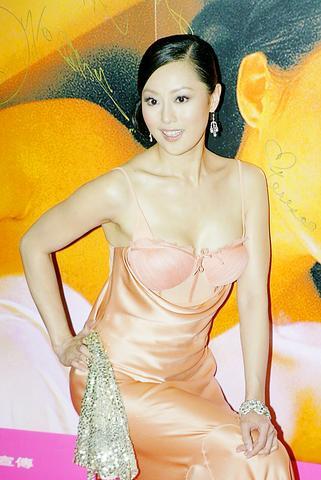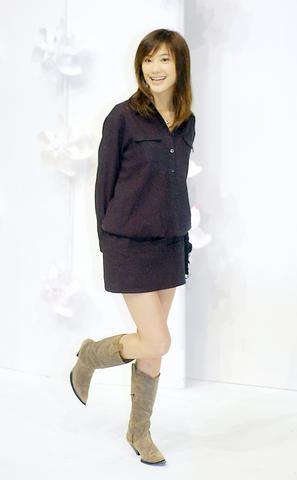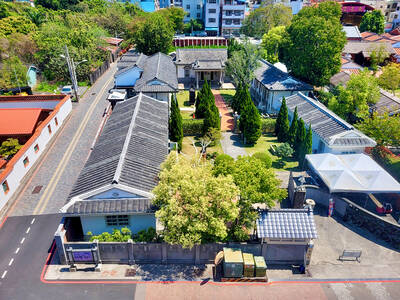Following hot on the heels of two Hong Kong actors -- Wu Hao-kang (吳浩康) and Zhou Yongheng (周永恆) -- who were caught with drugs last month, actress Cherrie Ying (應采兒) was arrested by Hong Kong police last Saturday for possession of a 0.8g bag of ketamine. She was released on bail of HK$1,000 (NT$4,300).
According to Hong Kong tabloids, Ying was at a KTV in Kowloon until 5:30am and then, taking a friend's Mercedes Benz, went speeding along Kimberley Way before being pulled over by police. Panicking, Ying dropped the bag of "Special-K," but was spotted doing so by cops on the scene.

PHOTO: TAIPEI TIMES
Hong Kong Police said Ying's bag of goodies had a street value of HK$100. Ying was taken to the police station and was soon released on bail. But, according to a spokesperson at her agency China Star Entertainment, Ying was at the police station because "she was asked to help with the police investigation and she herself was not involved."

PHOTO: TAIPEI TIMES
The 21-year-old Taiwanese-born, American-raised actress has played minor roles in hit movies such as Full Time Killer, My Left Eye Sees Ghosts and Visible Secrets II. Recently, she has become the rumored girlfriend of the playboy singer and actor Edison Chan (陳冠希).
Taiwanese actress Alyssa Jia (賈靜雯) has chosen the path well beaten by minor actresses before her, announcing she will marry into big money. She announced last Saturday that she will wed Charles Sun, son of George Sun, CEO of Air Tiger Express China. The Sun family owns three villas in the tony Thomson Shanghai Garden Villa residence, valued at NT$120 million, according to both Apple Daily (蘋果日報) and The Great Daily News (大成報). Jia was also reportedly given a three-carat diamond engagement ring worth NT$1 million. Jia, who declined to tell media the wedding date, recently resigned from the shooting of a TV drama in China and is believed by tabloids to be two-months pregnant.
Another reportedly pregnant celebrity is Chow Yun-fat's (周潤發) wife, Chen Hui-lien (陳薈蓮). Married for 15 years, the 50 year-old Chow and 45 year-old Chen have no children. Hong Kong paparazzi spotted Chen last week with a big belly. Chow did not confirm nor deny his wife's pregnancy but did say he had just bought a NT$210-million house in Kowloon and that the couple will move-in next year.
Apple Daily even consulted fortune tellers who predicted that Chow will have two kids in the coming three years, according to Chow's "eight characters."
Hong Kong party queen Zhang Xiao-hui (章小蕙) refuted reports of breast-enhancement surgery last week after Next Magazine (壹週刊) reported that her chest had been undergoing a period of "fast growth" from an A cup to a G cup. The magazine voiced suspicions that she has been under the knife more than once.
"I have never done any plastic surgery," was Zhang's reply to local media. She then parroted a refrain favored among stars who've faced similar reports: that her breast-enlargement secrets include yoga and Chinese medicine. Little S (小S) once told media that she took Chinese herbs and did aerobics to achieve her voluptuous figure, while the famously frail and formerly flat Jolin Tsai (蔡依林) said she had acupuncture therapy and Chinese medicine too.
Not only breasts, but also butts were also in the spotlight over the past week, as a celebrity fortuneteller said she can read one's future wealth by feeling buttocks. As a guest on Kevin Tsai's (蔡康永) show, she squeezed his butt and surmised that "he will make more money in the future." And as for his sexual performance, "it can be as long as 40 minutes."

April 28 to May 4 During the Japanese colonial era, a city’s “first” high school typically served Japanese students, while Taiwanese attended the “second” high school. Only in Taichung was this reversed. That’s because when Taichung First High School opened its doors on May 1, 1915 to serve Taiwanese students who were previously barred from secondary education, it was the only high school in town. Former principal Hideo Azukisawa threatened to quit when the government in 1922 attempted to transfer the “first” designation to a new local high school for Japanese students, leading to this unusual situation. Prior to the Taichung First

Chinese Nationalist Party (KMT) Chairman Eric Chu (朱立倫) hatched a bold plan to charge forward and seize the initiative when he held a protest in front of the Taipei City Prosecutors’ Office. Though risky, because illegal, its success would help tackle at least six problems facing both himself and the KMT. What he did not see coming was Taipei Mayor Chiang Wan-an (將萬安) tripping him up out of the gate. In spite of Chu being the most consequential and successful KMT chairman since the early 2010s — arguably saving the party from financial ruin and restoring its electoral viability —

The Ministry of Education last month proposed a nationwide ban on mobile devices in schools, aiming to curb concerns over student phone addiction. Under the revised regulation, which will take effect in August, teachers and schools will be required to collect mobile devices — including phones, laptops and wearables devices — for safekeeping during school hours, unless they are being used for educational purposes. For Chang Fong-ching (張鳳琴), the ban will have a positive impact. “It’s a good move,” says the professor in the department of

Toward the outside edge of Taichung City, in Wufeng District (霧峰去), sits a sprawling collection of single-story buildings with tiled roofs belonging to the Wufeng Lin (霧峰林家) family, who rose to prominence through success in military, commercial, and artistic endeavors in the 19th century. Most of these buildings have brick walls and tiled roofs in the traditional reddish-brown color, but in the middle is one incongruous property with bright white walls and a black tiled roof: Yipu Garden (頤圃). Purists may scoff at the Japanese-style exterior and its radical departure from the Fujianese architectural style of the surrounding buildings. However, the property